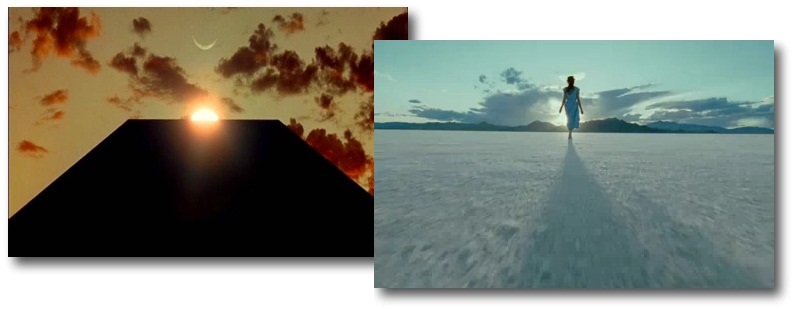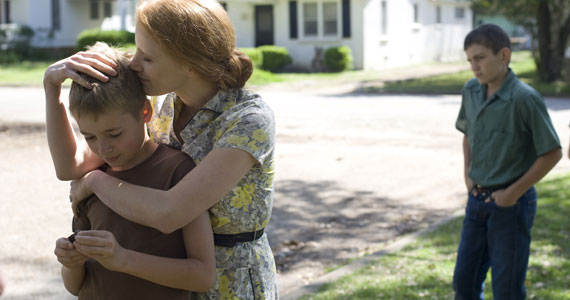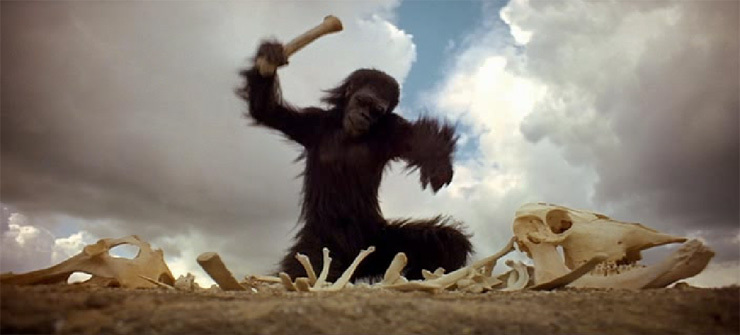Robert here w/ Distant Relatives, exploring the connections between one classic and one contemporary film.

It's not exactly the secret of the cinematic year that Stanley Kubrick's 2001: A Space Odyssey and Terrence Malick's Tree of Life are two films of a similar kind. Indeed as Tree of Life hype grew to its crescendo this past spring and reviews started hitting the web it seemed like almost a requirement for writers to reference the 1968 science fiction classic. There were, I think, three reasons for this. First, which we'll get to shortly, that the two films do indeed have much in common in terms of theme and narrative. Second that both are epic length stories that many cinephiles consider high-water marks in the medium, and finally the involvement of Douglas Trumbull whose special effects work helped realize 2001: A Space Odyssey. When it was announced that he'd be working on The Tree of Life and creating sequences of a cosmic nature, the inexorable relationship between these two movies seemed predestined, and no one had even seen the Malick film yet. But with all the hooting about space and science fiction and experimental narrative and Trumble effects, the connection between 2001: A Space Odyssey and The Tree of Life now feels more like a solid fact to state and less like a flexible area to explore. So let's explore it.
Questions about the meaning of life, ponderances about the origin of the world and wonderment about how it all connects isn't a new or even unusal theme in moviedom. But most of the time, in fact almost all of the time, filmmakers feel the need to create an onscreen surrogate for both themselves and the audience to ask these questions. So most films about the meaning of life involve a solitary figure, a writer or an artist or a chess-playing knight meandering about wondering out loud what it all means. In movies about the meaning of life, it is the goal of the protagonist to find the meaning of life. Not so in The Tree of Life and 2001. While characters do ponder big mysteries, it's the narrative itself that takes us to the origins of creation. And to be clear, I'm using the term "origins of creation" pretty loosely here applying it to both the big bang for The Tree of Life and the early evolution of man for 2001: A Space Odyssey. Events past, much like stars in the sky, seem to be much farther from us and closer to one another than truth would have it. But in each film, the point is the same, that the events that will make up the significant dramatic conflict in the picture mean very little without cosmic context.

This context involves where we've been, where we are, and where we're going, scientifically & religiously speaking. The purpose of showing both the grandeur of the universe and the primal nature of man's past is to suggest our smallness and the smallness of the characters in these films. To them, their lives and their conflicts are the encompass of their universe. But in the scope of history, they are miniscule. Malick and Kubrick do this by creating worlds that at first seem dissimilar but upon further investigation are very alike. If there's any consistent criticism of Stanley Kubrick it's that he is a "cold" director, caring less for his humans than for his technique. 2001: A Space Odyssey plays into the hands of this criticism, featuring stoic human characters and providing our only emotional payoff from the mind of a machine. This seems in great contrast to Malick's film about the daily life, fears, loves and feelings of a family. But Malick's filmography has always presented us with the image of a harmonious world invaded by human violence, apathy, and destruction. The present set segments of The Tree of Life (the ones featuring Sean Penn that have been criticized as a somewhat pointless framing device) show us a world constructed, or is that destructed, by modern technology, and are as cold and austere as anything found in a Kubrick film.
But neither director holds as much ill-will toward the human race as you may suspect. Both films ultimately take us to our unknown future, whether that be the future of one man or all of humanity is, in both cases, ambiguous at best. Interpretations of the "star child" into which astronaut Dave Bowman turns at the end of 2001 are varied and range from the suggestion of alien manipulation to natural evolution to spiritual rebirth. Kubrick's film's finale may generally be considered more atheistic than Malick's but even the then pope (John Paul II, quite the film buff) was said to be a fan and considered the film one of great spirituality. This spirituality is how most people have viewed The Tree of Life's final sequence which presents us with a "heaven" that doesn't exactly adhere to any specific religion's interpretation of such a place, but still seems to present man's ultimate destination as one of great peace, community and beauty. In addition to this, both films seem to view mankind's journey to this ultimate destination as one essentially intertwined with the act of creation and the relationship between the creator and the created, whether it be ape and tool, parent and child, scientist and AI, god and man, and may I add, filmmaker and film. The message seems to be that it is creation that give us meaning, and advances us from insignificantly miniscule and suffering to, ultimately, a state of grace.

Other Cinematic Relatives: Such is the uniqueness of these two films, no other were immediately apparent to me. I'll let you fill in your suggestions in the comments.